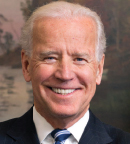Excitement was high on the last day of the 2016 Annual Meeting of the American Association for Cancer Research (AACR) in anticipation of Vice President Joseph R. Biden’s remarks related to the Moonshot Initiative to accelerate progress in cancer research. The Secret Service made elaborate preparations, and reporters had to enter the room where he was speaking 2 hours before his speech was scheduled.
Vice President Biden had the highest praise for AACR members and attendees for the hard work they do and their commitment to saving lives. “If the President and the whole White House were here, they would applaud you. There is more brain power in this room than in many countries. We need you badly [in the Moonshot effort] to give guidance on how to make it more likely to meet our goal [of accelerating progress in cancer research]. Your dedication awes me,” he told attendees.
Moonshot is personal for Mr. Biden and his wife, Jill, having lost their son Beau to glioblastoma this past year. This year, he met a woman diagnosed with glioblastoma, but she was rendered free of disease by a breakthrough in innovative therapy.
“There are so many breakthroughs just on the horizon. We are on the cusp of an inflection point in cancer discovery. I believe we can make them real if we make an absolute commitment to cancer as we know it,” he said.
Fortunately, accelerating progress in cancer research is one goal that Democrats and Republicans can agree on. “In a bitterly divided government, the political situation is more dysfunctional than I have ever seen. This may be the one subject where there is absolute unlimited bipartisan support,” the Vice President said.
“If we can accomplish the goal [of accelerating progress in cancer research], it will give Americans some hope. My commitment is to bring together all the human, financial, and knowledge resources we have in the world to make a quantum leap,” he continued.
Realigning Research Endeavors
Mr. Biden has traveled around the country and met with scientists, philanthropists, politicians, and other leaders seeking to define what needs to be done to realign cancer research initiatives. For starters, he gave the following suggestions, culled from multiple sources on how to streamline the process of getting grants to study cancer:
- Data should be shared. The system is set up so researchers are not incentivized to share their data. Data sharing will move the process forward more rapidly.
- Involve patients in clinical trial designs. With the current system, patients are not encouraged to enroll.
- Let scientists do science. Too often grants are given for research that has already been done.
The Prostate Cancer Foundation grant application process is a good example of how to streamline the process. The application is limited to 10 pages, and the applicant gets an answer within 30 days, whereas government grant applications are quite lengthy and take over a year to be awarded. “We slow down our best young minds before they can get their own grants, and when they do, they spend a third of their time on grant writing. It is like asking Derek Jeter to take a year off to sell bonds to build Yankee Stadium,” he said.
Progress should be measured by improving patient outcomes, not just by publications in peer-reviewed journals. Publication data should be made readily available to the public, but the journals own the data for a year after publication.
“Taxpayers fund billions of dollars a year for research; once published, that research sits behind walls for nearly a year. How does this move the process more rapidly,” asked Mr. Biden. “Results should be free and open once published.”
The work of verification of study results should be rewarded. Very few research grants are awarded to replicate study results.
“We should incentivize replication; in 1 review of 53 landmark studies, the results of only 6 could be verified,” he commented.
Celebrating the Work of Oncologists
“We are committed to celebrate the work oncologists are doing People’s lives depend on you. We believe in you. So do the patients,” he told the audience. “You are one of the most valuable resources this country has. So ask your institutions, your colleagues, your mentors, your administrators, how we can move this effort forward. I will do everything in my power to put the federal government in a position where it will be added value and not be in your way.”
“We are at your service. I believe together we can redesign or adjust the system to better support your efforts,” he concluded. ■


